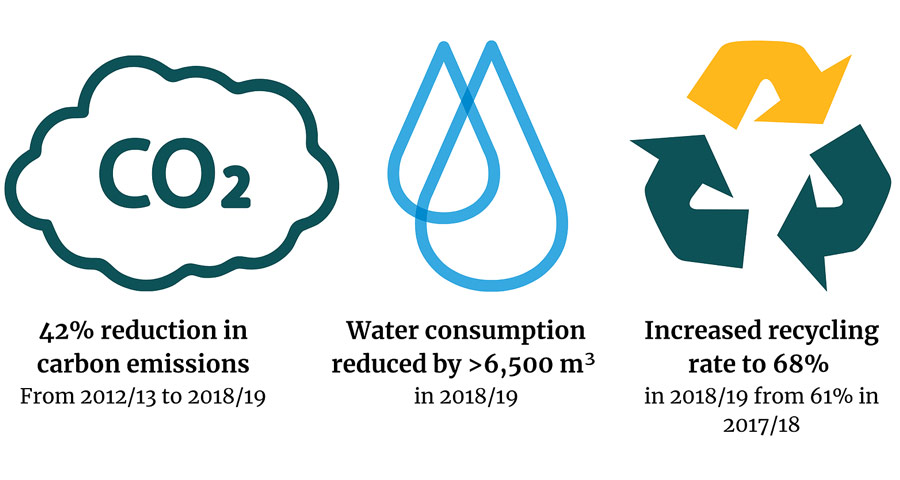As a global health institution we recognise our impact on the environment due to the nature of the work we do. We are taking significant steps to ensure this impact is mitigated and have a plan to deliver our mission in a sustainable way. Sustainability is at the centre of LSHTM’s values. We have set the ambitious target of reaching net zero carbon emissions by 2030. To ensure we achieve this we are continuously reducing our carbon emissions and improving of our overall environmental performance and have a number of policies in place to help guide us.
We identified the actions needed to achieve net zero in our Energy and Carbon Management Plan (ECMP) and have set-up sustainability subgroups to address the different aspects of our carbon impacting activities. These groups are working together and are core to achieving the goals set in our ECMP, which align with the Sustainable Development Goals. Our Sustainability Update 2021 (pdf) gives further insight into our progress and future plans.
In 2022 LSHTM was one of 21 higher education institutions to receive a prestigious Queen’s Anniversary Prize and subsequently took part in the one-year Platinum Jubilee Challenge. The resulting “Accelerating towards Net Zero” report provides a comprehensive overview of specific challenges and opportunities for decarbonisation of the tertiary education sector and how this can drive change across wider society. The report includes a first estimated total carbon footprint for the tertiary sector, a sector-specific Standardised Carbon Emissions Framework, as well as identifying three key action pathways to net zero: The built environment, travel and transport, and sustainable supply chains. A group of students based at the MRC Unit The Gambia also won the top prize in the 2022 Queen’s Platinum Jubilee Student Challenge with a project finding innovative solutions to waste recycling.
Governance
Following the development of the ECMP, the Sustainability Action Committee (SAC) was set up to assume responsibility for the implementation of the actions from the ECMP. This committee is chaired by the LSHTM Chief Operating Officer and reports to the Executive Team. The SAC committee is composed of heads of the relevant departments, academics and students. The different areas of impact are split into subgroups led by respective committee members. The SAC committee meets four times a year.
The MRC Units
The MRC Unit The Gambia at LSHTM and the Medical Research Council/ Uganda Virus Research Institute and London School of Hygiene & Tropical Medicine Uganda Research Unit are leading the way in the generation and use of greener energy sources. A solar power generation system at MRC Unit The Gambia at LSHTM - the biggest of its kind in The Gambia - produces 920 megawatts per annum, reducing energy bills by 25% and cutting 1,250 tons of annual carbon emissions. In Uganda, solar photovoltaic (PV) systems were installed and the MRC/UVRI and LSHTM Research Unit currently produces 45% of its energy requirement.
Both Units, in The Gambia and Uganda, have developed and are implementing Energy and Carbon Management Plans.
Energy and carbon management plan for our London buildings
In response to the UK Parliament declaring a climate change emergency in May 2019, we developed a comprehensive energy and carbon management plan with a commitment to achieve net-zero emissions by 2030.
Our plan has a commitment to achieve net-zero emissions by 2030 against a 2018/19 baseline through cumulative carbon reduction efforts across Scopes 1, 2, and 3 emissions – delivering at least a 50% reduction, with carbon offsetting used only for unavoidable emissions.
Scope 1
Direct greenhouse gas emissions from energy sources owned or controlled by the London School of Hygiene & Tropical Medicine.
Scope 2
Indirect greenhouse gas emissions from consumption of purchased electricity, heat, or steam.
Scope 3*
Other indirect emissions related to waste, water, travel, and procurement. *Scope 3 contributes around 70% to our carbon emissions.
- Energy and Carbon Management Plan (summary) (pdf)
- Energy and Carbon Management Plan (full version) (pdf)
Divesting from fossil fuels
LSHTM is a world leader in research on the health implications of climate change and policy responses. We are committed to improving our environmental sustainability, which includes our investment portfolio.
LSHTM divested from coal in 2015, and in 2020 we stated our intention to completely divest from fossil fuels. As of 31 December 2020 our investments in fossil fuels stood at £116,507, all of which we committed to removing from our portfolio by August 2021. As of July 2021, we divested our only remaining direct holding in a fossil fuel company. LSHTM has no plans to hold any direct investment in fossil fuels in the future.
Investing in a greener and healthier future
The London School of Hygiene & Tropical Medicine’s Sustainable Climate Impact Fund (SCIF) is a pioneering and progressive social enterprise focused on improving the health and socio-economic wellbeing of communities and their local environment in low- and middle-income countries.
A subsidiary of LSHTM, the SCIF is a unique initiative that uses carbon offsetting as a means to deliver solutions, placing transparency at the heart of its service. Unlike other offsetting schemes, the SCIF draws on LSHTM’s expertise in global health to put the health and socio-economic wellbeing of the people who need it most at the forefront of its operations and choices of intervention.
Sustainability themes
- Catering
-
LSHTM is a Fairtrade accredited University. We are committed to supporting Fairtrade in the products we procure and are seeking new ways to incorporate and promote Fairtrade across catering and other services.
In 2019, food served in our cafés and at catered events was redesigned to feature a ‘Planetary Pick’ menu that provides a healthy diet which also minimises environmental damage to our planet.
LSHTM has produced branded water bottles to promote reusable items as we are committed to decreasing the usage of single-use plastic.
The Seacole Social Cafe on Tavistock Place is committed to sustainability in its operations. Keepcups are on sale and disposable cups are compostable Vegware types.
Eco-friendly cleaning products are also used to keep areas clean and fresh without the use of harsh, synthetic chemical solvents.
The catering department offer free water refills, and everyone has access to the dedicated fountains across Keppel Street Building, and Tavistock Place.
LSHTM is working on a third-party certification called Green Kitchen Standard.
- Travel for work and commuting
The LSHTM Energy and Carbon Management Plan (ECMP) commits LSHTM to achieve net zero carbon emissions by 2030. Travel for work constitutes up to 70% of LSHTM’s carbon emissions. Switching to less carbon intensive modes of travel and reducing travel will make an important difference to our overall carbon footprint. The LSHTM Travel Policy encourages staff to:
- Reflect on the need for travel and whether the objectives of any particular proposed trip could be adequately met in another way;
- Reduce carbon emissions and environmental impact of travel for work through increased use of remote conferencing platforms, working from home, forward planning and consolidating itineraries, opting for less carbon intensive modes of travel including trains for trips in the UK and to other parts of Europe;
- Encourage sustainable, low carbon and healthier modes of commuting by staff and students, for example by making use of the Ride2Work scheme;
- Promote compliance with the procurement regulations by appointing and consolidating travel booking through preferred travel management supplier(s) who are able to provide the required information to facilitate the safety and carbon emissions objectives.
- Waste and recycling
We are conscious of the impact our activities have on the environment and are committed to minimising this impact and the use of natural resources, by reusing materials, recycling and reducing waste to landfill.
At LSHTM we are working to:
- Meet or exceed all waste related legislation and requirements;
- Implement waste strategies based on the waste hierarchy;
- Reduce waste production: we consider whether the item is being offered for reuse by another before buying. If not, then making sure that waste from the item purchased can be effectively reused or recycled. Where possible make attempts to repair items before going on to purchase new. Get suppliers to take back unwanted packaging when delivery is made as part of order form by procurement;
- Reuse items: explore opportunities to reuse items before disposing as waste. Examples are furniture, books and IT equipment;
- Recycle as much as possible: most materials can now be recycled; Purchase products that can be recycled and where possible are made from recycled materials;
- Recover useful materials from waste, energy from waste: for example, metal can be separated and taken to scrap yards and food waste can be collected and turned into compost;
- Disposal to landfill is the last resort for items that cannot be dealt with by any of the above options.
Responsibility for waste production and consequently waste management has to be shared by every member of LSHTM staff, students and partners.
- Sustainable purchasing
Goods and services we procure can have a huge impact on the environment and the natural resources. We can reduce our environmental impact and carbon footprint by changing our purchasing practices and taking more informed purchasing decisions. Purchasing is a good way of communicating our preference for environmentally friendly products to suppliers, manufacturers and the wider community. The LSHTM Sustainable Purchasing Guide provides staff members with clear guidance on the procurement and use of environmentally sound goods and services. Staff are encouraged to:
- Follow the Institution’s Procurement Policies;
- For sustainability criteria for most paper and stationary products the Procurement Department should be the first point of contact as the School’s positions on this are now well established;
- Unwanted furniture and other equipment should be donated for reuse. Surplus furniture and equipment can be donated and shared through WarPit. Contact the Sustainability Team for more information.
- Sustainable laboratories
Laboratories, on average consume up to 3-5x more energy per square meter compared to non-laboratory spaces. In addition, they use large amounts of water, consumables, and equipment in their operations, as well as generate significantly large amounts of hazardous and non-hazardous waste.
At LSHTM we recognise that laboratory spaces have huge potential in reducing these impacts and championing research that is conducted with sustainability embedded from the start. We are in the process of ensuring our labs become more energy efficient, recycle waste as much as possible, reuse and share equipment and only purchase what is necessary, taking the whole life costing into consideration. The LSHTM Laboratory Sustainability Group is continuously looking for new ways to make our labs more sustainable.
Contact Ali Church to find out more.


